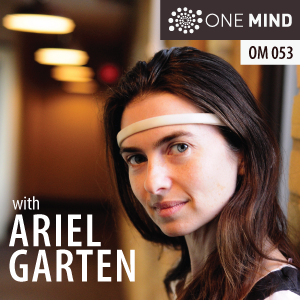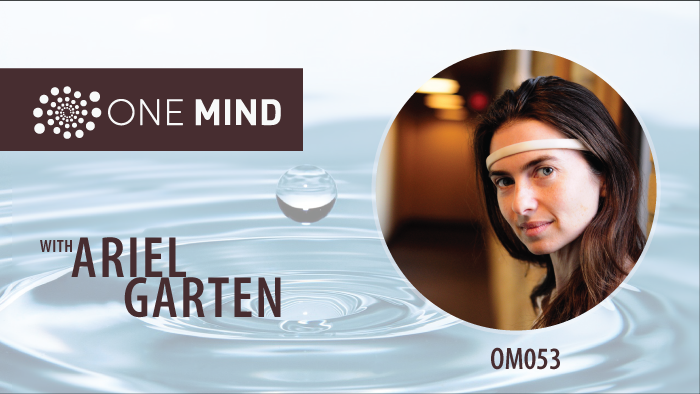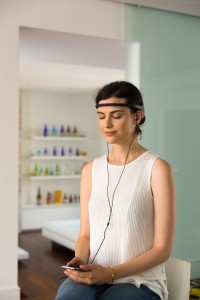

Can technology really help you meditate? What if there was a piece of hardware that actually let you know when you’re mind is wandering? And in doing so, helped you bring it back to center.
Well, it’s not sci-fi and you don’t have to wait. The technology to do this exists.
In fact, it’s been around for a few years. But it took a unique blend of talents and vision to turn that technology into an attractive brain sensing device that actually helps you center your mind and meditate.
It’s called MUSE: The Brain Sensing Headband. Loaded with a clinical grade EEG (electroencephalogram), MUSE is like an artifact from the future, which uses realtime feedback from your brain to teach you how to meditate.
In this episode of the OneMind Meditation podcast, we talk with Ariel Garten, a pioneer in the field of brain sensing technology and the cofounder of Interaxon Technologies, the company that creates MUSE.
Can Technology Make You More Human?

Ariel Garten and her team have a grand vision for MUSE. Contrary to a lot of technologies these days, which arguably make us less attentive, less available, and by extension, less human, MUSE is positioned to do the opposite.
In Ariel’s own words, technologies like MUSE should:
Get out of the way so that it can enhance, expand, and support our human experience so that we can become kinder, gentler, more engaged, more connected, more human and more loving individuals.
Ariel and her team were compelled to create MUSE for two reasons. First, to make the invisible…visible. That starts with the brain. As Ariel describes it:
The brain creates, determines, and defines the self and yet we have so little access to it.
Our brain is how we process the world, it’s all of our perceptions, it’s how we build relationships, it’s how we move our bodies, and yet we can’t interact with it.
We can’t see it, touch it, feel it, smell it, talk to it…its an invisible thing that drives us and I wanted to learn how to interact with it.
And brainwave sensing is a very simple way to do that and one of the first ways to tangibly do that—to make the activity of the brain visible.
The point of muse is to build that into every day to understand, improve, and interact with your mind in ways that can fundamentally change your life.
The second reason is no less ambitious. The folks at Interaxon want to change the world through meditation. And they think MUSE has a real shot at helping to make that happen.
How Does It Work?
 So how does it work? In simple terms, MUSE uses five electrodes to track your brainwaves.
So how does it work? In simple terms, MUSE uses five electrodes to track your brainwaves.
It then translates the movement of your mind—your brainwaves—into sound. In essence, you get to hear your own mind reflected back to you through MUSE.
Through a very simple feedback loop, you can then start to interact with your brain. As it happens, the best way to do that is…yep, you guessed it, through meditation.
The MUSE headband actually allows you to observe the qualities of your own awareness. Are you focused on the anchor of your meditation practice or is your mind wandering?
You’ll know instantly because MUSE has a clever way of reflecting it back to you. And over time, this feedback loop makes the movement of your mind more transparent to you and more objective.
In the process, you develop greater sensitivity to those moments when your attention drifts and, theoretically, you’re quicker to recover and bring your mind back.
That process of recognizing when your attention has wandered is the heart of any focused attention meditation practice. Except normally you don’t have an external feedback system letting you know when you’re mind has wandered.
In this way, MUSE can potentially accelerate that process of becoming more conscious.
Measuring The Impact Of MUSE
So how effective is MUSE and can it be used for medical purposes? It’s early days, but at present, 120 different research institutions are working with MUSE to study the impact of it’s application.
The MAYO clinic is running a study with breast cancer patients as a way to test muse as a way to manage stress related to surgery. Women receive a MUSE headset 4 weeks before surgery to manage the stress related to the cancer care process. They are also testing the effect on recovery times.
Another study with Harvard University and Spaulding Rehabilitation hospital is looking at the effects of MUSE around recovery from traumatic brain injury.
In this episode, Ariel Garten and I discuss:
- How Ariel’s background as a fashion designer, psychotherapist, and trained neuroscientist influence her approach to developing MUSE
- Why she and her team at Interaxon created MUSE
- How brain sensing technology works
- How brain sensing technology allows you to “listen” to your mind
- How Interaxon used brain sensing technology to light up Niagara Falls during the 2010 Vancouver Olympics
- How and why MUSE is a tool for developing self-knowledge
- How MUSE can make you a better meditator
Show Notes
- Get $37.35 off MUSE when you use this special discount link for OneMind Meditation Podcast listeners. At checkout choose:Podcast and Type: One Mind.
(Note: About Meditation is an affiliate partner with MUSE and may receive a commission for purchases made through this discount link.)
What a fantastic interview with 2 awesome friends. Great job Morgan!
Thanks Harry! And thank you for making the introduction. This interview wouldn’t have happened without you.
This tool is amazing! I am glad you did this interview! I actually think I may take the plunge and purchase this product to let me know how things are going when I actually meditate! Thanks again Morgan for another great podcast
Hi Kristian, That’s awesome. Thanks for your feedback. It’s such an interesting innovation. You know I’m impressed. I’ll be curious to know how it goes when you try it out and if you feel the same.
This podcast is fascinating!
Thank you very much for the interview Ariel.
So is the 299 price with the discount or is there a promo code?
Annie
Hi Annie,
Thanks so much! I’ve been enjoying testing it out periodically. Per your question, I just tested out the discount link. When you use this link, it’s $50 off of the $299 price. Once you get to the shopping cart, they apply the discount and it costs $249. I hope that helps. Thanks again!